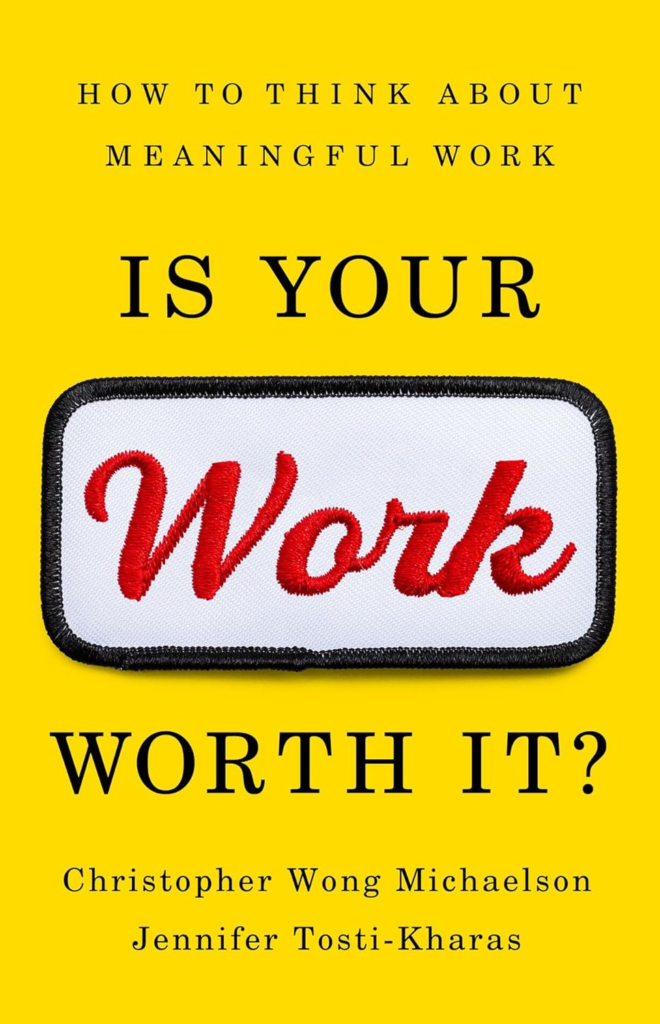“Work generally shares three formal characteristics: it is purposeful, effortful, and recognized by society as work – which often, though not always, means it’s worth getting paid for.” So say Christopher Wong Michaelson and Jennifer Tosti-Kharas in their new book, Is Your Work Worth It?. He’s a philosopher, she an organizational psychologist, and both are well-regarded professors skilled in challenging the reader to analyze the level of meaning in a chosen career. They continue: “At its most worthy, work gives us a reason to wake up, to exercise our unique talents, to contribute to something that is bigger than ourselves.” We’ve all seen the surveys that reveal one-in-two working adults in the U.S. is dissatisfied at work; look to your left and then right this morning (or, sure, in the mirror) and know the odds are good you’ll see someone who hits the snooze button multiple times, is underutilized, and/or believes their role does not advance important causes at the office or in society. That is bleak.
Restrained by golden handcuffs. Plodding away for the paycheck. Being house poor. These are the images one gets reading the book, of those who feel trapped. At their best, the authors dissect purpose with a twist: rather than tolerating a career to support a chosen lifestyle, what if we committed to an affordable reality within the limits of the work we aspire to do? A big change that’s easier said than done, naturally and yet perhaps achievable given enough runway. The alternative ain’t great, what with workers “in a metaphorical or literal sweatshop, pursuing uninspiring careers that have little value to them other than the money that compensates them for their daily misery.” (How do you really feel, Professors?) But note that Michaelson and Tosti-Kharas are also careful to not assume certain menial labor lacks purpose. While it’s not difficult to envision a future where so-called mindless work gets fully outsourced and/or automated, some find such work fulfilling. If a job provides the security, stability, and income which allow them to lead full lives outside of work, who are we to judge or support eliminating such roles when in an honest moment we might confess to being happier filling one, low pay be damned?
And then there is meaning. We’ve learned of the dubious distinction of essential workers in recent years (and the cloying canonization of cashiers and cabbies as ‘heroes’), but the pandemic aside vital work is an evolving matter. While we need not obsess over how crucial our job function is (or is not) on a daily basis, if we don’t periodically reflect on its meaning, the authors write, “then we may be left with a lifetime of regret about who we did or did not work for, the work we did or did not do, working too much or too little, or doing work that seems less than essential in retrospect.” At a minimum, this book will get you thinking about some of the nonsense you’ve allowed to become normalized in your day-to-day reality. The final paragraph centers on legacy and what role work plays in defining such. Contemplate that for a few moments, scratch down a goal or two to revisit this evening, and then get back to it. Bill Lumbergh is headed toward your cube, so time to jump into one of those fake Teams meetings and avoid eye contact, mmm’kay?
If you have anything to say about this – or book recommendations – kindly post below (rather than emailing me) to spark conversation. Thank you!


Can’t get enough of your reviews and writing. May I point out that the demise of long-term employment relationships is the emergence of freelance or gig work – if the work doesn’t suit you, move on to a different assignment.
Touche, John and very much appreciated. I’m often amazed by what folks are willing to tolerate at work. Inertia is a terrible thing.